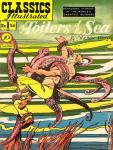Book 5 - The Revolver
Chapter 2 - Clubin Observes Someone
Zuela came sometimes to take refreshment at the Jean Auberge. Clubin knew him by sight.
For that matter Clubin was not proud. He did not disdain even to know scamps by sight. He went so far sometimes as to cultivate even a closer acquaintance with them; giving his hand in the open street, or saying good-day to them. He talked English with the smugglers, and jabbered Spanish with the _contrebandistas_. On this subject he had at command a number of apologetic phrases. "Good," he said, "can be extracted out of the knowledge of evil. The gamekeeper may find advantage in knowing the poacher. The good pilot may sound the depths of a pirate, who is only a sort of hidden rock. I test the quality of a scoundrel as a doctor will test a poison." There was no answering a battery of proverbs like this. Everybody gave Clubin credit for his shrewdness. People praised him for not indulging in a ridiculous delicacy. Who, then, should dare to speak scandal of him on this point? Everything he did was evidently "for the good of the service." With him, all was straightforward. Nothing could stain his good fame. Crystal might more easily become sullied. This general confidence in him was the natural reward of a long life of integrity, the crowning advantage of a settled reputation. Whatever Clubin might do, or appear to do, was sure to be interpreted favourably. He had attained almost to a state of impeccability. Over and above this, "he is very wary," people said: and from a situation which in others would have given rise to suspicion, his integrity would extricate itself, with a still greater halo of reputation for ability. This reputation for ability mingled harmoniously with his fame for perfect simplicity of character. Great simplicity and great talents in conjunction are not uncommon. The compound constitutes one of the varieties of the virtuous man, and one of the most valuable. Sieur Clubin was one of those men who might be found in intimate conversation with a sharper or a thief, without suffering any diminution of respect in the minds of their neighbours.
The _Tamaulipas_ had completed her loading. She was ready for sea, and was preparing to sail very shortly.
One Tuesday evening the Durande arrived at St. Malo while it was still broad daylight. Sieur Clubin, standing upon the bridge of the vessel, and superintending the manoeuvres necessary for getting her into port, perceived upon the sandy beach near the Petit-Bey, two men, who were conversing between the rocks, in a solitary spot. He observed them with his sea-glass, and recognised one of the men. It was Captain Zuela. He seemed to recognise the other also.
This other was a person of high stature, a little grey. He wore the broad-brimmed hat and the sober clothing of the Society of Friends. He was probably a Quaker. He lowered his gaze with an air of extreme diffidence.
On arriving at the Jean Auberge, Sieur Clubin learnt that the _Tamaulipas_ was preparing to sail in about ten days.
It has since become known that he obtained information on some other points.
That night he entered the gunsmith's shop in the St. Vincent Street, and said to the master:
"Do you know what a revolver is?"
"Yes," replied the gunsmith. "It is an American weapon."
"It is a pistol with which a man can carry on a conversation."
"Exactly: an instrument which comprises in itself both the question and the answer."
"And the rejoinder too."
"Precisely, Monsieur Clubin. A rotatory clump of barrels."
"I shall want five or six balls."
The gunmaker twisted the corner of his lip, and made that peculiar noise with which, when accompanied by a toss of the head, Frenchmen express admiration.
"The weapon is a good one, Monsieur Clubin."
"I want a revolver with six barrels."
"I have not one."
"What! and you a gunmaker!"
"I do not keep such articles yet. You see, it is a new thing. It is only just coming into vogue. French makers, as yet, confine themselves to the simple pistol."
"Nonsense."
"It has not yet become an article of commerce."
"Nonsense, I say."
"I have excellent pistols."
"I want a revolver."
"I agree that it is more useful. Stop, Monsieur Clubin!"
"What?"
"I believe I know where there is one at this moment in St. Malo; to be had a bargain."
"A revolver?"
"Yes."
"For sale?"
"Yes."
"Where is that?"
"I believe I know; or I can find out."
"When can you give me an answer?"
"A bargain; but of good quality."
"When shall I return?"
"If I procure you a revolver, remember, it will be a good one."
"When will you give me an answer?"
"After your next voyage."
"Do not mention that it is for me," said Clubin.
